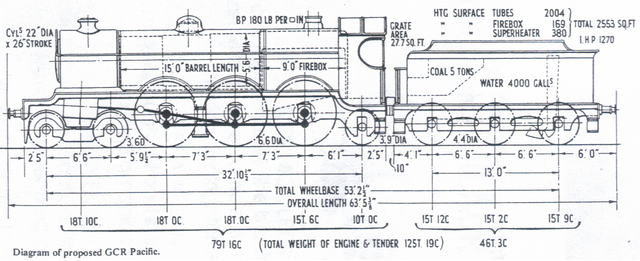Atlantic 3279 wrote: ↑Sun Jan 17, 2021 7:38 pm The valves would undoubtedly be piston valves at that date on the GCR, where slide valves had been dropped and anything else would be too experimental / unconventional.
The diagram appears to show 18 ton projected max axle load.
Thankyou.
Atlantic 3279 wrote: ↑Mon Jan 18, 2021 11:07 am I hadn't originally noticed the reference to both inside and "outside" valve gears, so I have to ask whether there is a clear and definite source for that information. External Stephenson's valve gear would be highly unusual, and certainly frowned upon by Robinson who had a keen sense of aesthetics. If it was a case of valve gear inside for outside cylinders, then we need to know with certainty whether any inside cylinders were also proposed.
Sorry I used someone else's pre existing technial specifications table as a template and filled in in without thinking or checking it. The Stephenson valve gear was a guess given the Atlantics and the presence of a step between the first two wheel splashes. Wikipedia on 1090, "These cylinders had their Stephenson valve gear replaced with Walschaerts valve gear, which was the only application of this valve gear, excluding railcars, on a GCR locomotive".
I've unfortunately been unable to find anymore information about the design.
Hatfield Shed wrote: ↑Sun Jan 17, 2021 11:09 pm Perhaps this was a sketch that was bever fully thought through?
That might be the case as:
"It was fairly common occurrence for the .C.M.E. to ask his Drawing Office to produce outline drawings of certain types embodying, were possible, existing standards regarding boiler, cylinders, tender and so forth, and introducing, where necessary, up to date improvements”, Dow G., 1965, P.326.
If it was a simple drawing office outline, (rather then designed by Robinson himself) intended as a starting point, (similiar to the, "A0" plans) then the technical problems of such, "hodge podging" of features, (such as: 4 cylinders, small firebox and boiler, and inconsistent .I.H.P.) would make sense.
Atlantic 3279 wrote: ↑Mon Jan 18, 2021 11:07 am but in that case what would be the point (other than looks and publicity) to such a large, heavy, complicated and expensive loco with little more ability than existing cheaper and simpler types with greater route avilability?
Personally it seems like something that Fay would do for publicity purposes, (perhaps inspired by the .P.R. of .G.W.R.'s Great Bear?) and presumably Gorton wouldn't have minded/cared so that leaves Robinson known for being a strict disciplinarian and conservative locomotive designer. Could Fay have ordered the outline made without him knowing?


